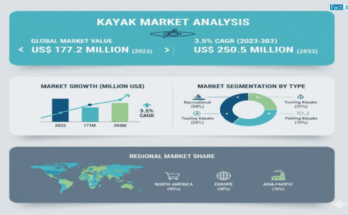The global smart sports fitness tracker market is valued at US$ 2.88 billion in 2023 and is projected to reach US$ 4.52 billion by 2033-end, expanding at a CAGR of 4.6%.As the global population becomes increasingly health-conscious and technologically adept, the integration of smart devices into daily life is reshaping the future of personal fitness and wellness monitoring.
Smart sports fitness trackers ranging from smartwatches to smart bands are now integral to modern health routines. These devices monitor parameters such as heart rate, sleep quality, steps taken, and calories burned, helping users achieve wellness goals with precision. Once exclusive to athletes and fitness enthusiasts, these trackers have now entered mainstream consumer lifestyles, driven by awareness of weight management, chronic health conditions, and preventive healthcare.
Driving Market Momentum: AI and Health Awareness Transforming Consumer Behavior:
The market’s rapid rise is fueled by a convergence of artificial intelligence (AI), digital connectivity, and public health consciousness. Advanced AI-powered fitness tracking systems are offering real-time insights, virtual coaching, and predictive analytics—delivering personalized feedback that empowers users to maintain consistent fitness routines.
“Technology is redefining personal health management,” notes a Fact.MR analyst. “AI integration in fitness tracking not only enhances accuracy but also provides tailored fitness experiences that were previously exclusive to professional training environments.”
As consumers prioritize health following the COVID-19 pandemic, wearable devices that measure heart rate, oxygen saturation, and temperature are gaining traction. The shift toward self-monitoring and preventive care has created sustained demand across both developed and emerging economies.
Regional Insights: Growth Fueled by Health Culture and Technological Innovation:
United States: The U.S. market is forecasted to grow at 4.5% CAGR, driven by the adoption of corporate wellness programs and a societal shift toward healthier lifestyles. Employers are increasingly providing fitness trackers to staff to promote workplace well-being, significantly contributing to device adoption rates.
Germany: Germany’s robust engineering expertise and health-focused culture make it a key growth hub. The demand for high-precision, durable smart trackers aligns with the country’s reputation for quality manufacturing and health-conscious living.
Japan: Japan presents a unique opportunity due to its aging population and cultural emphasis on longevity. Elderly consumers are embracing smart trackers for vital sign monitoring, while younger demographics continue to demand technologically advanced, sensor-equipped devices.
Category Insights: Activity Tracking Dominates the Market:
The activity tracking segment remains the dominant application, reflecting a surge in participation in physical activities such as running, cycling, yoga, and swimming. Fitness trackers are also gaining traction among professional athletes, coaches, and training centers seeking precise data on performance and recovery.
The incorporation of OLED and AMOLED displays, e-textiles, and smart clothing is expanding the boundaries of wearable technology. These innovations enhance comfort and accuracy, allowing users to monitor health seamlessly through connected apparel and accessories.
Chalenges: Data Privacy and Cybersecurity at the Forefront:
Despite promising growth, manufacturers face challenges related to data privacy and security. Fitness trackers collect sensitive user data—including personal, health, and geolocation information—which can be vulnerable to cyber breaches.
Incidents such as the exposure of military base locations through wearable data have underscored the need for stricter security protocols and encryption technologies. Industry leaders are now prioritizing data protection frameworks and transparent user consent policies to build consumer trust and regulatory compliance.
Strategic Pathways for Manufacturers and New Entrants:
As competition intensifies, both established and emerging players are pursuing innovation-driven strategies. Investment in R&D for enhanced battery life, AI algorithms, and biometric sensors remains a key differentiator.
New entrants are leveraging e-commerce and direct-to-consumer models to penetrate the market efficiently. Collaborations with established online platforms and sports brands offer exposure to global audiences without heavy infrastructure costs.
Additionally, companies are embracing sustainability initiatives, employing eco-friendly materials and energy-efficient production methods to appeal to environmentally conscious consumers.
Recent Industry Developments:
– Apple Inc. launched the Apple Watch Series 5 with onboard GPS, heart-rate tracking, and enhanced fitness analytics.
– Garmin introduced Venu 2 and Venu 2S smartwatches in India, featuring AMOLED displays and 25+ pre-installed sports apps.
– Catapult Sports released Catapult One, a performance-tracking wearable designed to deliver advanced analytics for athletes.
Such innovations emphasize how the global fitness tracker industry is converging toward precision, personalization, and performance qualities that resonate deeply with consumers and professional athletes alike.
Future Outlook: Expanding Horizons for Smart Fitness Ecosystems:
Between 2029 and 2033, the market is expected to see significant investment in smart jewelry, connected footwear, and sensor-embedded apparel, redefining the wearable landscape. The integration of biometric monitoring with mobile health apps and telemedicine platforms will further bridge the gap between consumer wellness and clinical health management.
East Asia and South Asia are poised for robust growth, supported by expanding disposable incomes, rising fitness awareness, and affordability-focused innovation.
Conclusion: A Call to Action for Industry Leaders:
The global Smart Sports Fitness Tracker Market is not merely a trend it represents the evolution of personal healthcare and digital fitness. With technology, data analytics, and consumer behavior converging, industry leaders have the opportunity to shape the future of connected wellness.
Companies that invest in AI-driven innovation, data security, and sustainable design stand to capture the next generation of health-conscious consumers. As fitness becomes a lifestyle and not just an activity, the time is ripe for manufacturers to redefine wellness through smart technology.
Browse Full Report-https://www.factmr.com/report/216/smart-sports-fitness-tracker-market


